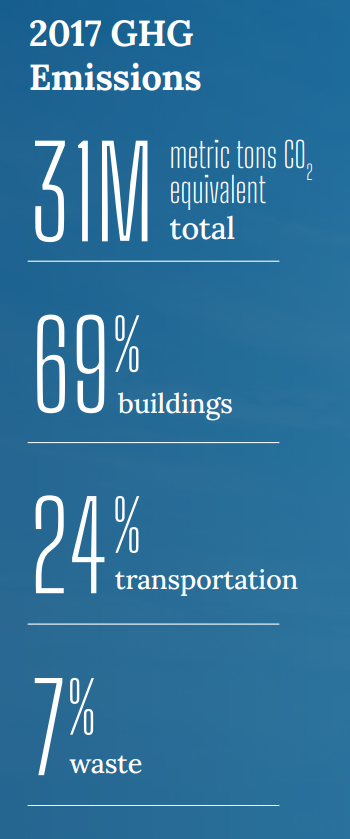Electrify Chicago
An independent tool for viewing City of Chicago building data
According to the
2022 Chicago Climate Action Plan,
69% of Chicago's emissions come from buildings, making
building emissions our biggest challenge and our biggest opportunity as a city
to tackle climate change. At Electrify Chicago, we showcase building performance using
publicly available data supplemented by community-submitted photographs and building
owners.
Start by looking at Chicago's buildings with the highest greenhouse gas intensity i.e. emissions per square foot. Large, efficient, buildings can perform much better than very inefficient small buildings on this metric.
New Article
📰 $30 Million In Missed Fines
The City Of Chicago failed to collect $30 million in potential fines from the building benchmarking ordinance, reducing transparency and accountability.
Legislative update! 🎉
As of late January 2024, legislation is being introduced to require new use more efficient forms of water and space heating, via the Clean And Affordable Buildings Ordinance (CABO), which will reduce the number of highly polluting and inefficient buildings that end up on this site.
If you're in Chicago,
write to your alderman to support the CABO!
Chicago Buildings by Greenhouse Gas Intensity
Note: Data includes large Chicago buildings with data from 2022, unless explicitly stated otherwise.
Note: This data only includes buildings whose emissions are reported
under the
Chicago Energy Benchmarking Ordinance. According to the City “As of 2016,
this list includes all commercial, institutional, and residential buildings larger than
50,000 square feet.” This dataset is also then filtered to only buildings with
reported emissions > 1,000 metric tons CO2 equivalent.
The latest year of data is from 2022, but we update the site regularly when new data is available, and some buildings may have failed to report that year, and only have older data available.
| Property Name / address | Primary Property Type |
Greenhouse Gas Intensity (kg CO2 eq./sqft) |
Total Greenhouse Emissions (metric tons CO2 eq.) |
|---|---|---|---|
|
4437 S CICERO AVE
4437 S CICERO AVE
| Senior Living Community | 7.0 kg/sqft
Highest 39%
| 695 tons
Lowest 40%
|
|
2800 W MONTROSE AVE
2800 W MONTROSE AVE
| Senior Living Community | 7.0 kg/sqft
Highest 39%
| 446 tons
Lowest 21%
|
|
CASL Senior Housing
2108 S PRINCETON AVE
| Multifamily Housing | 7.0 kg/sqft
Highest 39%
| 479 tons
Lowest 24%
|
|
5401 S HYDE PARK BLVD
5401 S HYDE PARK BLVD
| Multifamily Housing | 7.0 kg/sqft
Highest 39%
| 587 tons
Lowest 33%
|
|
424 W DIVERSEY PKWY
424 W DIVERSEY PKWY
| Multifamily Housing | 7.0 kg/sqft
Highest 39%
| 555 tons
Lowest 31%
|
|
Hampden Court Apartments
🕰️
2740 2750 N HAMPDEN CT
| Multifamily Housing | 7.0 kg/sqft | 439 tons |
|
328 S Jefferson
328 S Jefferson
| Office | 7.0 kg/sqft
Highest 39%
| 2,041 tons
Highest 22%
|
|
The National
(CPS)
125 S Clark St
| Office | 7.0 kg/sqft
Highest 39%
| 4,078 tons
Highest 9%
|
|
3656 W HURON ST
3656 W HURON ST
| Senior Living Community | 7.0 kg/sqft
Highest 39%
| 490 tons
Lowest 26%
|
|
Carver Millitary Academy -CPS
🕰️
(CPS)
13100 S Carver Dr
| K-12 School | 7.0 kg/sqft | 2,086 tons |
|
Harold Washington College
🕰️
30 E Lake St
| College/University | 7.0 kg/sqft | 2,430 tons |
|
Chicago Temple Building
77 W Washington
| Office | 7.0 kg/sqft
Highest 39%
| 1,678 tons
Highest 28%
|
|
Hyatt Center
🚩
71 S Wacker Dr
| Office | 7.0 kg/sqft
Highest 39%
| 11,762 tons #49 Highest
|
|
Citigroup Center
🚩
500 W Madison St
| Office | 7.0 kg/sqft
Highest 39%
| 12,992 tons #40 Highest
|
|
The John Hancock Center
🚩
📷
875 N Michigan Ave
| Mixed Use Property | 7.0 kg/sqft
Highest 39%
| 15,923 tons #26 Highest
|
Data Source:
Chicago Energy Benchmarking Data
